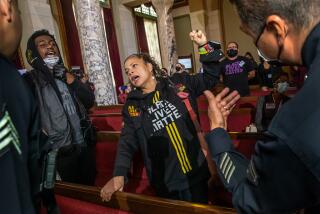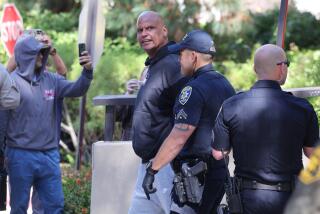‘Disorderly conduct’ laws give wide latitude to arrest
- Share via
WASHINGTON — For some defense lawyers, the arrest of Harvard professor Henry Louis Gates Jr. was less about racial profiling than about how persons can be arrested simply for speaking angry words to a police officer.
The laws against “disorderly conduct” give police wide power to arrest people who are said to be disturbing the peace or disrupting the neighborhood.
In Massachusetts and elsewhere, courts have said the “disorderly acts or language” must take place in public where others can be disturbed.
It is probably not a crime of disorderly conduct for a homeowner, standing in his own kitchen, to speak abusively to a police officer.
According to his police report, Sgt. James Crowley said the professor was “yelling very loud” and “accusing me of being a racist.”
Complaining that the “acoustics of the kitchen” made it difficult to communicate, the officer said he “told Gates that I would speak with him outside.”
Once on the front porch, the officer arrested Gates for being loud and abusive in the presence of several neighbors who had gathered on the sidewalk.
“You might think that in the United States, you have a right to state an opinion, even an offensive opinion. But prosecutors like to say you don’t have a right to mouth off to the police,” said Boston defense lawyer Samuel Goldberg.
“Gates was saying, ‘You are hassling me because I’m black.’ I understand how that’s offensive to a police officer.
“It’s astounding to me to call it criminal.”
Police officers can arrest people in their own homes for accosting police, interfering with an investigation or resisting a lawful arrest. But Gates was not accused of interfering with an investigation.
“I would say it is not constitutional to arrest someone in his home just for being loud and abusive to a police officer,” said Boston University law professor Tracey Maclin. “That’s why the cop asked him to come outside, where he could be arrested for being disorderly in public.”
Most lawyers who looked at the reported details of the incident say both men could have easily avoided a confrontation. Crowley, after learning that Gates was the homeowner and not an intruder, could have left and ignored the abuse.
For his part, Gates continued to loudly berate Crowley as he was leaving the house, according the police report.
Gates was placed under arrest, the police report said, because of “his continued tumultuous behavior outside the residence, in view of the public.”
--
More to Read
Sign up for Essential California
The most important California stories and recommendations in your inbox every morning.
You may occasionally receive promotional content from the Los Angeles Times.











